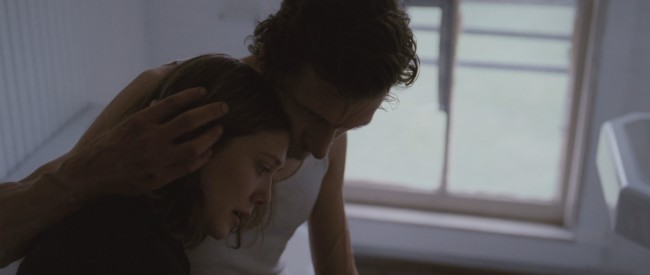
But all of this is incidental to the film's spellbinding success as an atmospheric mood piece, a psychological mystery, and a miniature thriller. It wants to draw us into the mind of this damaged young woman.
"M-4" moves back and forth between Martha's reticent and troubling reunion with her sister, and flashbacks to her time spent in an almost idyllic rustic commune where the clock seems to have been turned back on cultural norms and gender roles. It is like two films in one, and writer/director Sean Durkin clearly delineates the two through design and color and rhythm.
As Martha remembers more, and the sordid truth of her existence in the unnamed, unexplained cult is slowly peeled away to a scene of shocking violence, the two portions of the story slowly escalate in tension, in tandem, until we understand that Martha may not have completely shaken the delusion that she has never really escaped. It's a quiet cinematic exercise in suspense, and manipulation of our expectations.
While the film is sinister and beautiful in the flashbacks, it is just as beautiful and quietly suspenseful in the film's other half, at the lake house where Martha escapes. It is here, too, that the performances resonate.
Elizabeth Olsen is the movie's backbone, the point at which the two portions of the film diverge and come together. It is a tricky part, and Olsen manages to convince us that she is harboring dangerous secrets while at the same time is in a disbelieving haze. She erupts into toughness and then retreats, and we can understand her caretakers' fear. It is a strong, star-making performance.
No less effective is Sarah Paulson, as the older sister, who is aided by a nicely-written characterization; she alternates concern and frustration with what Martha refuses to talk about, and accomplishes this perfectly naturally.
As Martha's brother-in-law, Hugh Dancy is charming and handsome, and he verbalizes the viewer's own doubts about Martha's motives. He confronts Martha, not realizing that her sudden displays of lethargic disrespect are part of her ongoing delusion.

Almost two weeks after seeing this film, what lingers is a quietness, an intensity, the feeling that something is building to a shocking revelation that will change the lives of these characters for good. The movie is filled with dread. It is also brimming with intensely beautiful images of the rural existence of the cult that held Martha for many years, and the safe existence of the lakehouse where Martha's sister takes her in.
Eating is an important motif. The emptiness of Martha's existence manifests itself in a preponderance of scenes in which Martha is eating; it is as if she is trying to fill the emptiness other than physical hunger. I liked the cleverness of this, as a viewer is likely to experience something of the physical emptiness of this character.
No explanation is ever given for why Martha was lured into joining a cult. The movie provides few insights into the trauma of cult behavior; this story is too specific, instead building to a shocking sequence involving a break-in and murder, which in itself would be enough to derail a sensitive girl like Martha. John Hawkes, as the smooth leader and womanizer, is good enough to make us believe that he can hold these young people in his spell, and lead them to situations that require sudden violence. This was my first exposure to Hawkes (I missed "Winter's Bone") and he has sort of an addicted appearance, looking older than he probably is, with a weathered, sinewy, almost emaciated toughness. He is likely to be typecast in unsavory roles.

The film's title was hopelessly scrambled in my mind until Hawkes' character tells Martha that she "looks like a Marcy May". The Marlene of the title refers to an alias that all women are instructed to assume when taking phone calls in the commune.
The end of the film may be a little bit of a cheat. No spoilers here, but given the fact that there is still so much we want to know about this character, that to end in mid-sequence, before we know if what we're seeing is real, and if so if a decision will be made, seems like a screenwriting cop-out.
That aside, "Martha Marcy May Marlene" is one of the year's more original and unusual films, a high-functioning indie, that I recommend to those in the mood for a mysterious visual experience and intriguing psychological study.

Excellent review, Tom! The sense of dread in M-4 is palpable. This is a seductive thriller and Elizabeth Olson is remarkable. I think it's one of the best cinematic surprises of 2011.
ReplyDelete